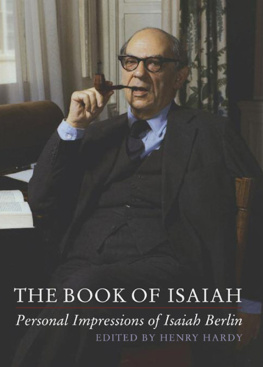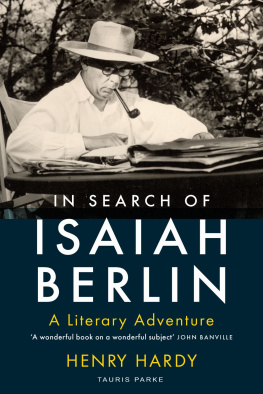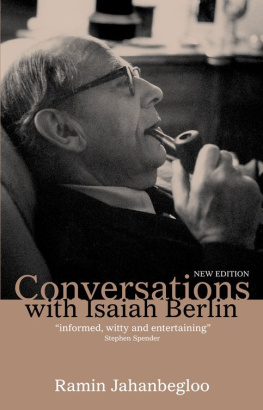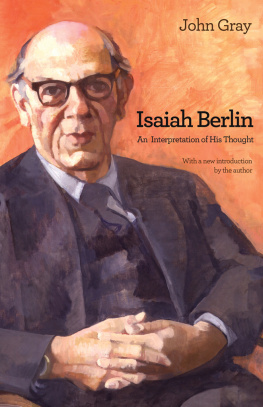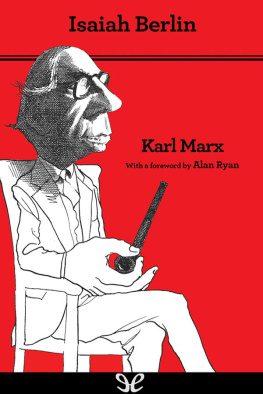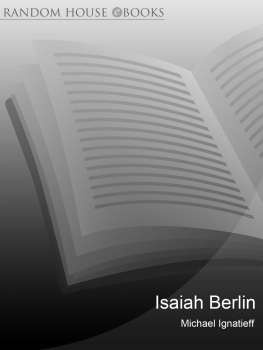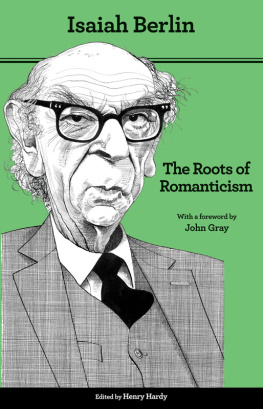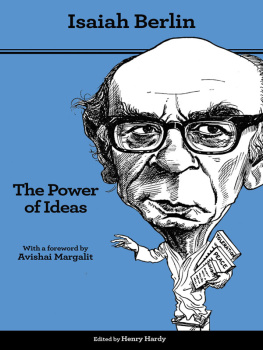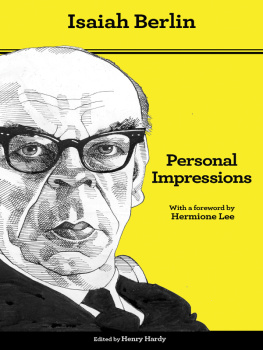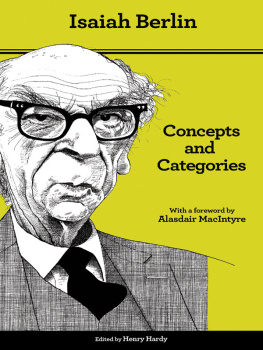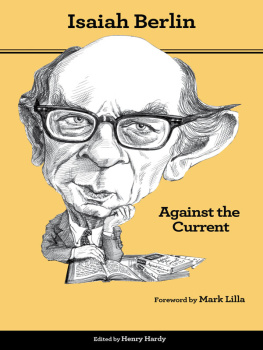Isaiah Berlin was born a century ago. One of the most celebrated British thinkers of the twentieth century; he was a tireless champion of freedom and diversity against control and conformity. His generous, open vision of life is displayed with special immediacy in his brilliant pen-portraits of contemporaries, Personal Impressions, in which he sees the point of radically differing personalities, enters into their distinctive outlooks, and describes his encounters with them, in arrestingly idiosyncratic prose.
The Book of Isaiah turns the tables on Berlin, offering a series of personal impressions of him and his ideas by a range of people who knew him, or have been affected by his work. This multi-faceted testimony enriches and supplements Michael Ignatieffs celebrated authorised biography. The volume includes tributes written when Berlin died, essays specially commissioned from friends and from students of his work, and a previously unpublished family memoir by Berlins father, which preserves for his son, and for posterity, the story of his Hasidic forebears, and of the many relatives murdered by the Nazis. The result is a collection indispensable both for existing enthusiasts and for those who are curious to learn about Berlins unique, compelling appeal.
[Includes] first-rate contributions from, among others, the philosopher Bryan Magee; his biographer Michael Ignatieff; and Henry Hardy. DAILY TELEGRAPH.
An impressive cast assembles to pay [Berlins] genius homage. THE INDEPENDENT.

Individual contributions the several contributors or their heirs and assigns 2009 except as separately here specified
Poem by Edmund Wilson Helen Miranda Wilson 2009; published by permission of Farrar, Straus and Giroux, LLC, on behalf of the Edmund Wilson Estate
Berlin in Autumn by Michael Ignatieff The Regents of the University of California and the Doreen B. Townsend Center for the Humanities 1999
The Berlin Papers in the Bodleian Library by Michael Hughes Oxford University Press 2005
Editorial matter Henry Hardy 2009
The moral right of Henry Hardy to be identified as the editor of this work has been asserted
All rights reserved. Except as permitted under current legislation no part of this work may be photocopied, stored in a retrieval system, published, performed in public, adapted, broadcast, transmitted, recorded or reproduced in any form or by any means, without the prior permission of the copyright owner.
First published 2009
The Boydell Press, Woodbridge
This edition published 2013
ISBN 978-1-78204-141-2 (eBook)
ISBN 978-1-84383-453-3 (Hardback)
The Boydell Press is an imprint of Boydell & Brewer Ltd
PO Box 9, Woodbridge, Suffolk IP12 3DF, UK
and of Boydell & Brewer Inc.
668 Mt Hope Avenue, Rochester, NY 14620, USA
website: www.boydellandbrewer.com
The publisher has no responsibility for the continued existence or accuracy of URLs for external or third-party internet websites referred to in this book, and does not guarantee that any content on such websites is, or will remain, accurate or appropriate.
A CIP record for this book is available from the British Library
Designed and typeset in Garamond Premier Pro by David Roberts, Pershore, Worcestershire
Books by Isaiah Berlin
KARL MARX
THE HEDGEHOG AND THE FOX
THE AGE OF ENLIGHTENMENT
RUSSIAN THINKERS
CONCEPTS AND CATEGORIES
AGAINST THE CURRENT
PERSONAL IMPRESSIONS
THE CROOKED TIMBER OF HUMANITY
THE SENSE OF REALITY
THE PROPER STUDY OF MANKIND
THE ROOTS OF ROMANTICISM
THE POWER OF IDEAS
THREE CRITICS OF THE ENLIGHTENMENT
FREEDOM AND ITS BETRAYAL
LIBERTY
THE SOVIET MIND
FLOURISHING: LETTERS 19281946
POLITICAL IDEAS IN THE ROMANTIC AGE
ENLIGHTENING: LETTERS 19461960
With Beata Poanowska-Sygulska
UNFINISHED DIALOGUE
For more information on Isaiah Berlin visit
http://berlin.wolf.ox.ac.uk/
For Sally Denholm-Young
and Serena Moore
Contents
This is the place of Isaiah Berlin,
The man who is clever & yet without sin;
Who has spent years at Oxford, yet still remains straight
And has never been taken by anyones bait.
Edmund Wilson
(written on a card from the Ritz-Carlton Hotel, Boston)
Preface
S OME YEARS AGO I lent a copy of Isaiah Berlins volume of essays on his contemporaries, Personal Impressions, to a friend and neighbour, the psychiatrist Bob Gosling. When I later asked him what his own personal impression was of the book and its author, he confessed: I did get rather tired of all that praise. There is certainly a lot of praise in that collection, and it is no doubt partly a matter of taste how one responds to the kind of sustained enthusiasm for humanity in all its teeming multiplicity that was one of Berlins hallmarks. But Goslings response also misses a point. The prominence of praise was quite deliberate. Berlin much preferred celebration to denigration, on the whole, and his main purpose in the pieces that make up that volume is to see the point of each of the very various people he writes about to accentuate the positive, as the song has it and to convey it to the reader, which he duly does, often to spellbinding effect.
When Wolfson College asked me to compile a book about Berlin to mark the centenary of his birth, it seemed natural to turn the tables on the master eulogist and invite a number of those who have encountered him closely, in person or on paper, to provide their own personal impressions of the man, and of the point of his life and work. So there is much praise here too. Indeed, one might issue a warning to readers, along the lines of those announcements that precede radio or television programmes liable to offend their audience: This book contains strong laudatory content throughout. Nevertheless, I think there is also in these pages a sufficient lacing of detachment and reservation to placate Goslings shade. And even those who find accumulated eulogy indigestible cannot fail to be struck by the power Berlin had to elicit personal love and intellectual and moral admiration in almost every, if not quite every, quarter. The degree to which he did this is surely remarkable and exceptional by any standard, and deserves examination. What manner of man was this? This is the question to which this collection is addressed.
Just as there is wide variety among the subjects of Berlins own personal impressions, so there is among the impressionists who depict him here, and therefore among their impressions, for all that they also often agree in judgement and sentiment. But it is a central truth for Berlin that variety among opinions need not be a sign of error. Samuel Guttenplan quotes Berlins excellent remark about the widely differing accounts of Irving Berlins famous lunch with a Winston Churchill who believed his guest was Isaiah Berlin: There are many versions of this story, all true. In this volume there are many different, sometimes conflicting, impressions of Berlin, all true.
I should say something about the structure of the book, and about my rationale for choosing the contributors. The text proper begins with reflections by Evan Zimroth on Berlins origins, stimulated by her encounter with the engaging anecdotal history of his family written by Berlins father Mendel for his son, and published here, as an appendix, for the first time. Mendel vividly conveys the very un-English world into which Berlin was born, the world out of which he was transplanted only at the age of eleven. Berlins Jewish and Russian roots are rightly stressed by those who write about his life, and about its impact on his thought, just as they were by Berlin himself, and this is one of the most important source-documents for the understanding of those roots, quite apart from its value as social history. Evan Zimroths contribution well displays such understanding, and I shall not trespass further on its territory here.
Next page
